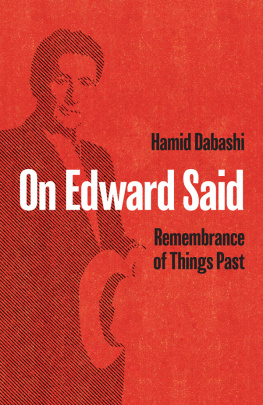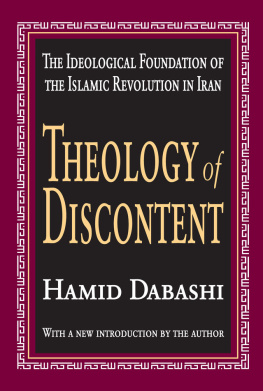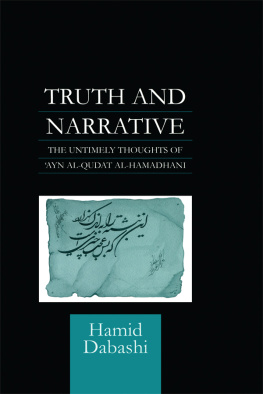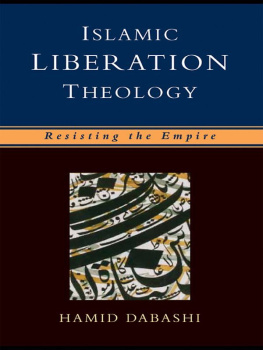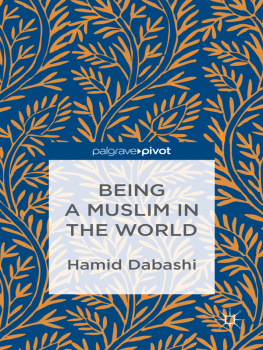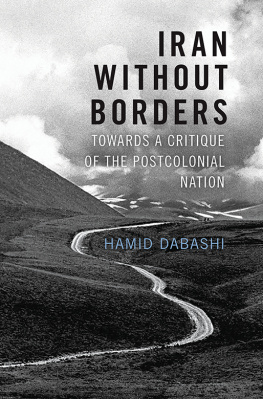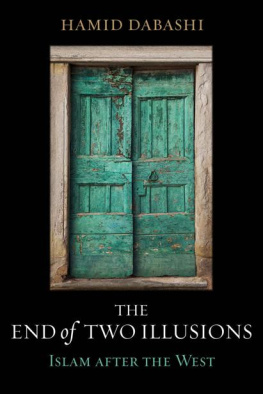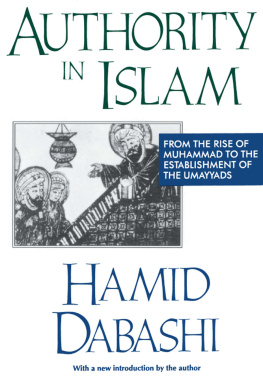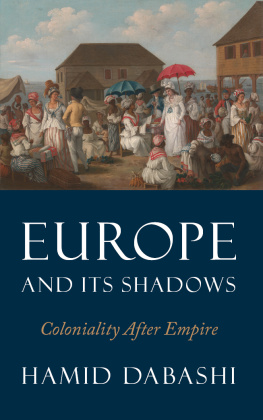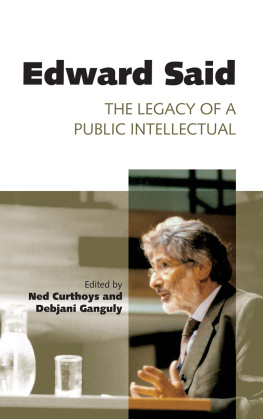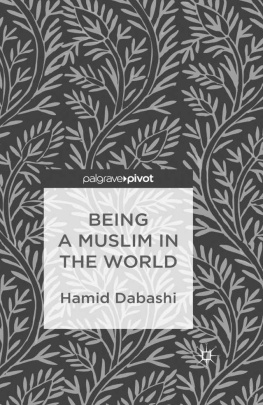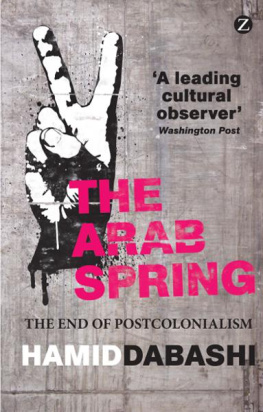PRAISE FOR ON EDWARD SAID
This book moves elegantly between anecdotes in Edward Saids life and a profound analysis of the intellectual contribution of one of the most influential thinkers of our times. Hamid Dabashi guides us skillfully between Saids universalist, humane, and moral position and his total commitment for the liberation of Palestine. With the help of this book we revisit, in a very accessible language and a straightforward style, Saids intellectual prominence and impact on cultural studies. We are also introduced once more to the extent of his commitment to the struggle for justice in Palestine. Whether you are a devoted Saidian or a newcomer to his world, this book is essential reading. ILAN PAPP
In this beautifully written book of profound reflections and vivid recollections, Hamid Dabashi conveys from the perspective of a fellow traveller precisely how and why Edward Said stands as one of the most important intellectuals of his times. The book carries the torch of Said in its literary sensibilities, in its ethical inflection of the political, and in a shared understanding of how the particularity of the Palestinian struggle is universal in its import. Inspired by Said, Dabashis critical and creative memoir becomes a true source of inspiration in its own right. CAROLINE ROONEY
Reading Dabashi is like going for an extended coffee with a very smart friend. VIJAY PRASHAD
Saids influence was far from being confined to the worlds of academic and scholarly discourse. An intellectual superstar. MALISE RUTHVEN, obituary, the Guardian
Hamid Dabashis respect and affection for Edward W. Said and his intellectual legacy are manifest throughout this book. As a former colleague and friend of Saids, Dabashis engagement is not only personal, but also emphatically political and intellectual. JOSEPH MASSAD
Hamid Dabashi has written a deeply moving text that pays tribute and engages with one of the most important thinkers of our time, Edward Said. The book is composed of essays, documents, and shorter political pieces which skillfully highlight the impact of Saids work on pressing political issues. The original presentation shows Saids influence over many years not only on Dabashi himself but on so many others who struggled and continue to struggle with what it means to challenge Eurocentrism and the brutal legacy of colonialism. This is a book that is a must-read not only for those interested in Said but for anyone who reads him for the sake of a life committed to justice. DRUCILLA CORNELL
A lyrical homage to his friend and colleague, the great Palestinian theorist, humanist, and agitator Edward Said. Dabashi follows in Saids footsteps, reliving his own march through Mideast war zones, and jousts with Islamophobes with lively turns of phrase and a soul laid bare. TIMOTHY BRENNAN
If you want to know more about Edward Said, the person, the intellectual, the friend, the political public figure, this a book to read. And it is more than that. Palestinian American Edward Said is revived in the memories of Iranian American Hamid Dabashi. At a time when hate is propelled by the state to extreme heights, what transpire from these pages are care, respect, and decolonial love between a Palestinian American and Iranian American connected through colonial wounds inflicted upon migrants from the Middle East. Through the chapters, you will find also the dignified anger with which Said and Dabashi responded to the intolerance and hate toward free thinkers in the public sphere. The account of personal and professional ethics that Dabashi learned from Said is not only a distinctive feature of the book but it is of extreme relevance when free thinking at the university has been mutating into corporate thinking. WALTER D. MIGNOLO
By turns skeptical and erudite, passionate and poetic, Hamid Dabashis book is animated by his love for Edward Said and his work. It will raise many hackles, but in its provocations it challenges one to rethink many of the standard clichs and prejudices of our time. Some pages are threaded with melancholy, others with anger, as in his white-hot assessment of the films of Michael Haneke and the books of his academic opponents. Above all, On Edward Said is powered by Dabashis commitment to the ideal that Palestine belongs to the Palestinians whether Jews, Christians, or Muslims. There is not a page in this book that does not challenge its reader. Whether one disagrees with it or not, this is a work that will leave its mark on all who read it. DAVID FREEDBERG
This remarkable collection of essays and interviews represents a long and diverse journey with a constant companion: the living memory of Edward Said. In lucid and passionate prose, Dabashi reminds us how much we need to return to Saids thought and work, especially in the darker moments of our despair, when we can, if we concentrate, find him waiting for us to awake, to arrive. This is how death, for Dabashi, becomes a form of suspension rather than a terminal loss. MICHAEL WOOD
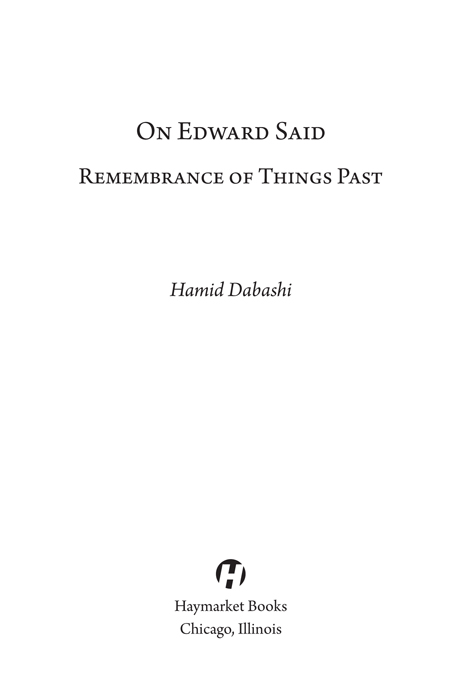
2020 Hamid Dabashi
Published in 2020 by
Haymarket Books
P.O. Box 180165
Chicago, IL 60618
773-583-7884
www.haymarketbooks.org
ISBN: 978-1-64259-391-4
Distributed to the trade in the US through Consortium Book Sales and Distribution (www.cbsd.com) and internationally through Ingram Publisher Services International (www.ingramcontent.com).
This book was published with the generous support of Lannan Foundation and Wallace Action Fund.
Special discounts are available for bulk purchases by organizations and institutions. Please call 773-583-7884 or email for more information.
Library of Congress Cataloging-in-Publication data is available.

For Abdelwahab El-Affendi the Quiet Revolutionary
INTRODUCTION
The memory of a few people
Brightens me
Gives me strength
Sends me on my way
And the cold and old
Furnace of my home
Is warmed
By the warmth of their noble breath
The memory of a few people
Is the sustenance of my soul
Anytime Im saddened
I turned to them
Their memory gives me courage
Brightens me
Nima Yushij (18971960)
This volume is something of an intellectual autobiography of my prolonged and fruitful relationship with the late Edward W. Said (19352003)at once personal, collegial, and intellectual and all of that in a spirit of political comradery. I decided to put together in a single volume the essays, articles, and chapters that I wrote and published on various occasions beginning with my obituary for Edward Said when he passed away on September 25, 2003, at the age of sixty-seven, and concluding with the short essay I wrote when his arch nemesis Bernard Lewis (19162018) passed away on May 19, 2018, at the age of 101. Needless to say, I had a deeply personal and affectionate relationship with Said, while Bernard Lewis gave me the creeps any time I thought of him and his deeply racist and treacherous thoughts and actions on Arabs and Muslims. Yet my affection for Said has never prevented my critical encounter with his monumental work, and my distaste for Bernard Lewis does not mean I ever harbored any ill will toward him. I am happy he lived a long and satisfying life. I just wish he had been less of an evil man. There is just a poetic justice between these two moments, when a towering intellectual with enduring significance in my thinking passed away, and when a man who stood for everything I detest rushed to meet his Creator.
Next page
